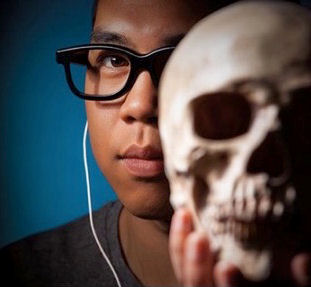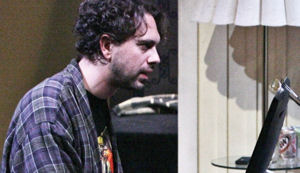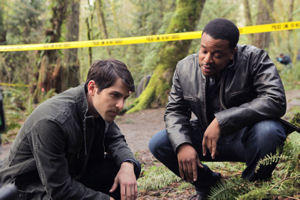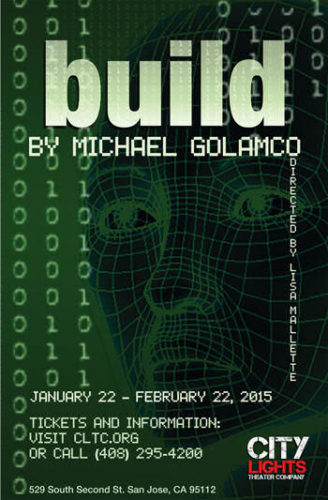
On episode #382 of the podcast, we had a chance to talk to writer Michael Golamco, the playwright behind the City Lights Theater Company’s sci fi gaming drama BUILD. Since penning that play (and several other critically acclaimed works), Michael has become a writer on NBC’s hit supernatural thriller GRIMM, and so we realized that his work had a double tie-in to the Fanboy Planet audience.
We thought it would be good to transcribe the interview, just in case someone interested in Michael’s work doesn’t listen to the podcast. There must be a few…
Fanboy Planet: Did you join the staff of GRIMM before or after the premiere of BUILD?
Michael Golamco: I think I had just started right after BUILD at the Geffen.
Fanboy Planet: Okay. We’ll get back to GRIMM, because though we have not really covered the show too intensely on the site, I know that many of our readers are fans. But we want to talk about BUILD, which is opening January 22 at the City Lights Theater Company in downtown San Jose. It’s a bit of science fiction, and as I look over your other work, I see a strong thread of geekery. What was your inspiration for BUILD? Have you spent time here in the Silicon Valley?
Michael Golamco: I actually grew up in the Bay Area. I grew up in San Mateo and then we moved up to Marin. I went to high school in Marin. My high school job was programming. So I’d commute into the City on the Sausalito Ferry.
Yeah, I did that. I never really lived in Silicon Valley as a kid. Eventually I went to UCLA, and I stayed in LA. But the Bay Area has been a big part of my life.
Fanboy Planet: I figured you must have had some experience, because… I don’t know if this is in the script because I haven’t read the actual script, but (BUILD) takes place inside… at least the Geffen Playhouse production design did it… it was inside an Eichler.
Michael Golamco: Yeah, exactly. It is an Eichler.
Fanboy Planet: That’s one of my favorite kind of houses.
Michael Golamco: Absolutely intentional. You know, it’s one of those bungalow types of houses that are all over (the Bay Area). They’re fantastic.

Fanboy Planet: You have that Bay Area connection. And then, I think I saw in the New York Times or the LA Times that you did some research with World of Warcraft, and that helped with inspiration for this play.
Michael Golamco: Yeah. Most of the programming that I have done for work has been data-base related, SQL stuff, so I wanted to understand some more about game development. So I got a textbook about Massive Multiplayer Online Role-Playing Games. I read all the articles there, the client server design. That was very interesting, but I wanted to see how these things played.
Usually I’m a console gamer. I play a lot of single player things. So I decided I should check out World of Warcraft.
I got the client. I started playing it. It was pretty addictive, for the first part. I joined a guild, and after a while, my research sort of tapered off with it. I was pretty much done. There were a lot of fresh quests, but this was a few years ago. It was all like “gather ten orc bones…” and all that stuff.
I stopped playing for a while, and then a month later, I thought I’d check in. And they had kicked me out of the guild, for not being around. I had lost my scabbard and all that stuff.
It was an interesting social experiment. I felt this pang of rejection for getting kicked out of this guild full of people that I didn’t really… well, you know them online, but…
Fanboy Planet: You were judged by a group of 12-year-olds…
Michael Golamco: Yeah, but really, at that point, it was really my fault. I hadn’t been around.
Fanboy Planet: According to your website, the play was actually commissioned by Daniel Dae Kim (LOST, Hawaii 5-0). But he never got to play one of the roles.
Michael Golamco: It’s been really tough. We’re essentially all on TV schedules. Dan is on Hawaii 5-0 now, and Joel de la Fuente, the other actor, is also a friend of mine. He was the first person to come to me with the idea, the commission to say “let’s write a play.”
He’s now on The Man in the High Castle, on Amazon. I haven’t seen it yet, but I’m really looking forward to it, because I love that book. It’s such an interesting book. I love alternate history, so I want to see how this is realized for the small screen. But anyway…
Joel and Dan came to me with this idea, and then I came to them with the idea of “let’s do something about guys who make video games.”

Fanboy Planet: I don’t want to do any spoilers for the play, but it does take a pretty hard sci-fi turn. You have a technology, actually a couple of technologies, that just do not exist yet. Not having seen what City Lights is doing with it yet, I don’t know how they’re envisioning it. But I know that in the Geffen production, a lot of it was more suggested. Are you going to come up and see the production?
Michael Golamco: I’d really love to. I’m hoping to later in the run. Right now, I’m about to shoot another one of my episodes of GRIMM, so I have to be up in Portland in the next couple of weeks. I should be back sometime in February. Hopefully I’ll be able to catch it. I’m really looking forward to seeing it.
Fanboy Planet: How did you go from being a programmer to a playwright?
Michael Golamco: I’d always been writing and also doing technology stuff, ever since I was a kid. My dad brought home a Commodore 64 when I was a little kid. Back then, you had magazines like Byte and things like that would have programs printed in the magazine. You would type them in, in BASIC, and then you’d run them. That kind of taught me how to program.
From there, I did the standard migration from Commodore 64 to Apple IIe to IBM PC to HP, all the way up to 386, 486 in IBM. All that stuff.
I was doing that all throughout high school and college. I worked my way through college working for the UCLA Medical Center. First at the help desk, and then eventually prototyping software, building software for presenting database information to patients and physicians.
So that’s always been part of my life. And writing has always been part of my life. The two of them, programming and writing, they’ve got a lot of similarities. Your’e trying to say the most using the least amount of code. You’re trying to do things efficiently. There’s a lot of creativity involved with both of them. They kind of dovetailed together in my life, in a lot of different ways.
After a while, I’ve been very lucky to be able to program and make my living doing that. And then make the transition to making my living writing. It’s been a real blessing.
Fanboy Planet: Let’s talk, too, a little about that transition to writing for GRIMM. You’d done a couple of screenplays…
Michael Golamco: I’d been writing screenplays for a while, and essentially I wanted to do some TV writing. It’s a matter of creating a couple of writing samples. I wrote two pilots, and my manager took them out, and managed to sell one.
I developed another pilot for Warner Brothers. Off of that, I realized that I needed staffing experience. So we used them as writing samples in staffing season. I got this job on GRIMM, and it’s been fantastic. I love working on the show. It’s really fun.

Fanboy Planet: You were there from the very beginning?
Michael Golamco: Oh, no, no, no. I started with Season Three, and it’s now our fourth season. It’s just been really fun. The cast and the crew have been fantastic. They pretty much live in Portland now. And our crew, they’re essentially like lumberjacks that carry around grip equipment. They’re great. All of them are just sweet people.
For a first time staffing experience, you couldn’t ask for a better experience.
Fanboy Planet: What would you consider the most challenging in transitioning from being a playwright to episodic television work?
Michael Golamco: For a playwright to go to television, it’s actually a fairly easy transition. You just have to start thinking more in terms of TV structure.
Just to give you an example of scale, for instance. When I first started — I drink a lot of Diet Coke. People know that now. I drink a ton of Diet Coke. So when I first started working on GRIMM, coming from a theater background, I was like, okay, I need to find a place where I can buy Diet Cokes, so I can always have a Diet Coke in my hand.
In our office suite, down the hall there was a vending machine. I was glad I found it. Great! I can get my Diet Cokes out of here. So I go into our kitchen in our office suite, and I open the fridge. And I just see stacks and stacks of soda, food, everything.
I asked one of our assistants, “whose Diet Coke is this? It’s in our fridge…”
“Uh, that’s our Diet Coke.”
“What do you mean, that’s our Diet Coke? Whose Diet Coke is this?”
“Mike, that’s yours. That’s ours. You can have as much Diet Coke as you want. The network buys it for us. This is your Diet Coke. You own this Diet Coke.”
And I was like, “whoa. This is incredible.”
Fanboy Planet: This is heaven for you.
Michael Golamco: In the theater, there’s no money. There’s so little money for playwrights and for productions. Everyone’s kind of pushing. It’s about the love. But you can’t really eat love. And you can’t use love to pay rent.
It’s a completely different world. In TV, of course, you still have budgets. And you still have to watch the bottom line, and the bottom line is very important. But it’s a completely different method of production.
Fanboy Planet: When you landed a place like the Geffen, one of the better known theaters in Los Angeles, and you had a guy in the production who had just hit it big on The Newsroom (Thomas Sadoski). To see a full production, you had done a workshop before, but what was it like to be on the edge of Hollywood with this play?
Michael Golamco: I loved that production. The people were fantastic. The director that we had was great, the cast was great. Tommy was just in Wild as Reese Witherspoon’s divorced husband. He was on her journey with her on the phone, her backbone back home. He was fantastic.
That was a real blessing, doing it there. I’ve been really lucky with the circumstances that I’ve been in. You couldn’t ask for more. I almost feel like, wow, how did I luck into all this stuff? It was a fun experience, and it taught me a lot about the play.
This new production, I think, hopefully I will get a chance to see it, and it will teach me even more about the play. The actors are still learning about it, and I’m still learning about it.
That’s what’s different about playwriting and television. Because it’s in a three-dimensional space right in front of you. You can still make adjustments all the way up to the end of the last preview.
It’s on a timeline, but it’s not like, “this has to work today.” It’s more of a cerebral, kind of cultural, art form, I guess. There’s a lot of thinking, and there’s a lot of fun you can have with playwriting.

Fanboy Planet: Is this the same script, or have there been revisions since the Geffen?
Michael Golamco: There have been some revisions. There are some things that I brought back that we deleted from the Geffen production. There’s some stuff about bathrobes that I put back in. There’s this bit about how bathrobes are the ultimate in human clothing because there are so many uses. They’re perfect for all sorts of things. Some of those things I resurrected.
Fanboy Planet: During the Geffen rehearsal, Tommy had broken his foot, which you worked in, and it made a fantastic character bit.
Michael Golamco: That was a hell of a thing. Tommy was going for a run on a hilly road, and a car hit him or something, and he broke his foot during previews, right before the play was about to open.
Typically, that’s a kind of huge and crazy thing to have to deal with, but we just did some rewrites. I think one or two quick rewrites to explain it, which was that he had had an accident with his Nintendo Wii.
Fanboy Planet: Has that stayed in? Because I thought it was an interesting externalization of the woundedness of his character.
Michael Golamco: I’m not sure. I think it’s in the script still, but it’s something you can keep or not keep. He was in a lot of pain during the first performances, but he made it work. He is an amazing actor.
Fanboy Planet: Absolutely. He had been kind of a jerk in the first season of The Newsroom, and I thought, oh, man, he’s going to be a jerk, and he just transformed. What a great actor. And I know that the actors up here in San Jose are great, too. It’s carrying on your blessings. Thank you so much for coming on with such short notice.
Michael Golamco: No problem. I really appreciate it.

